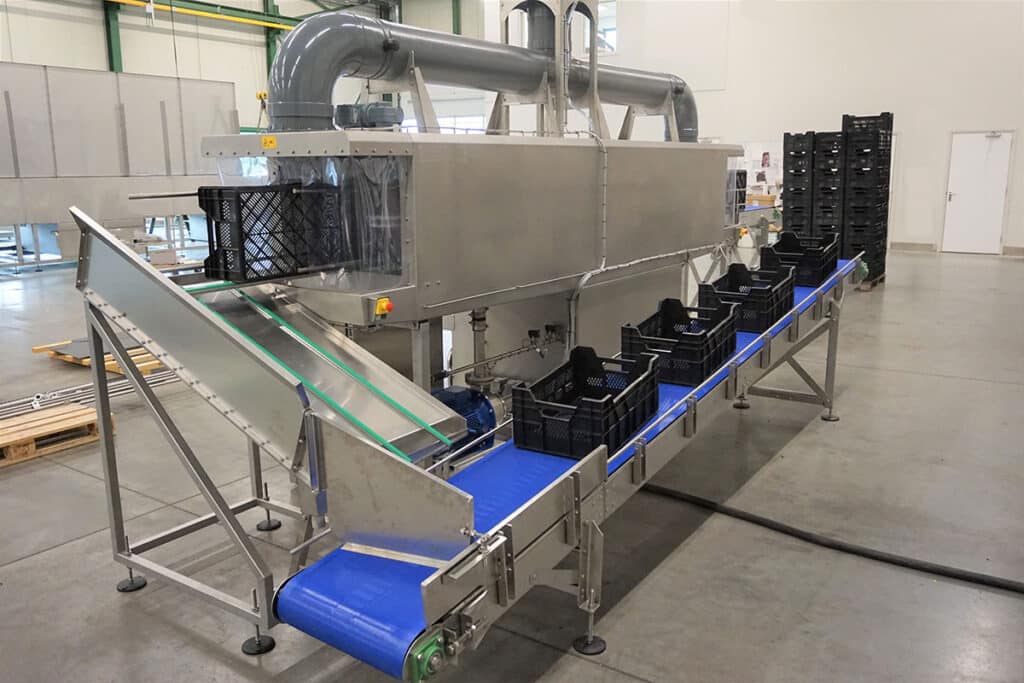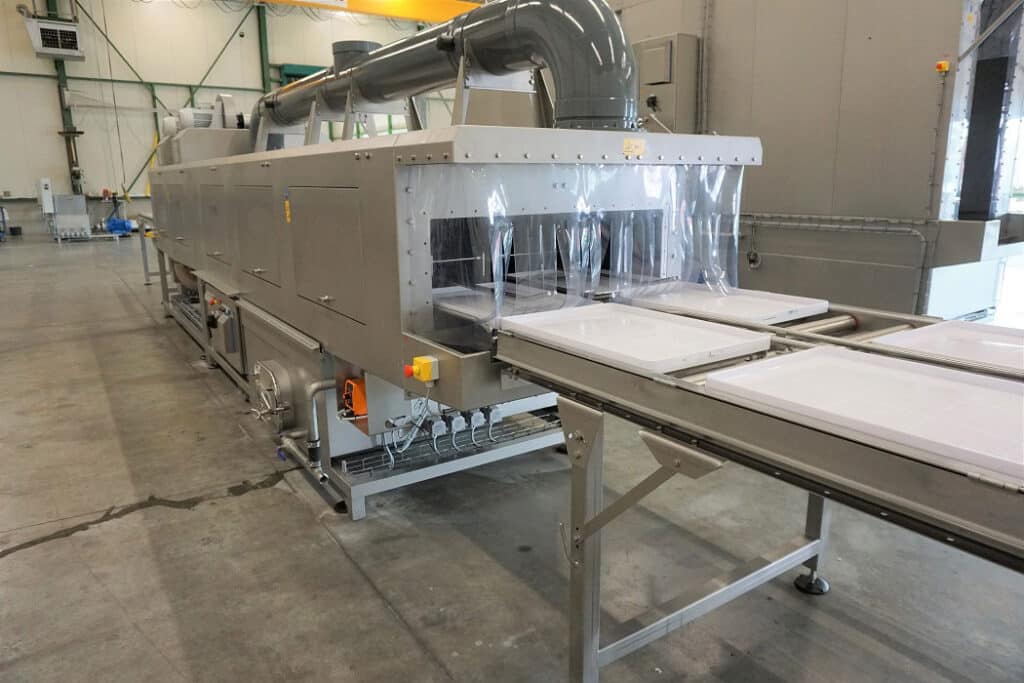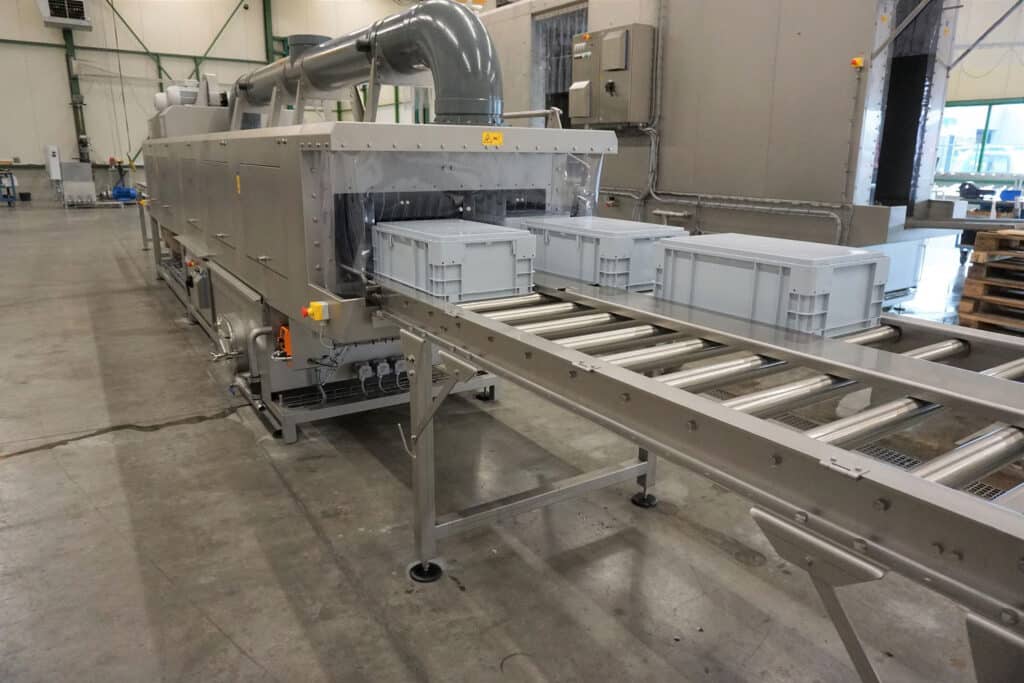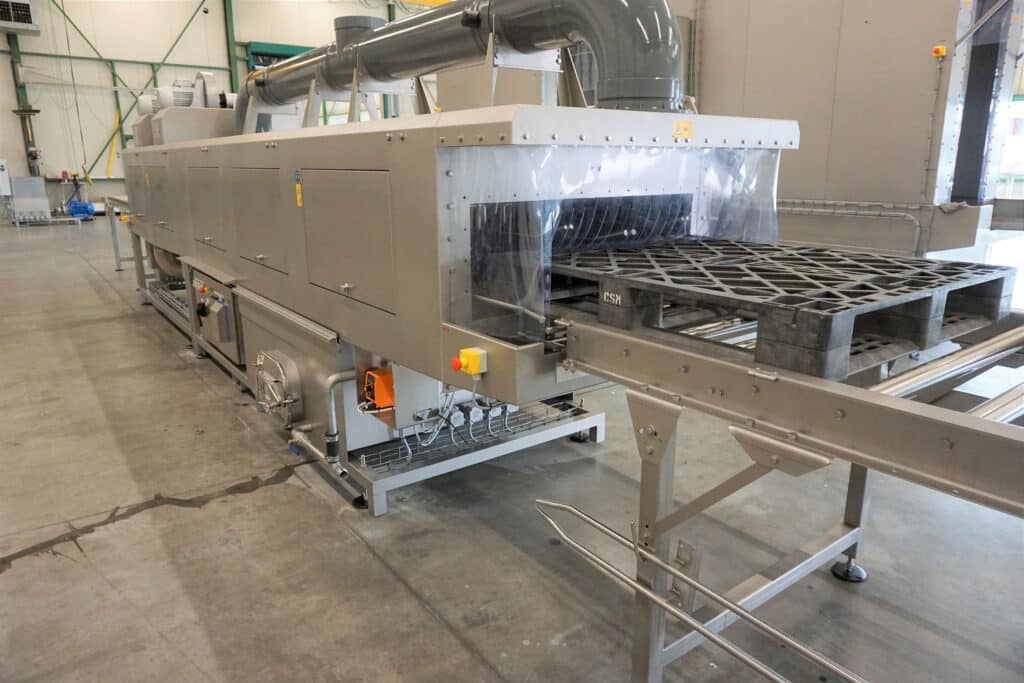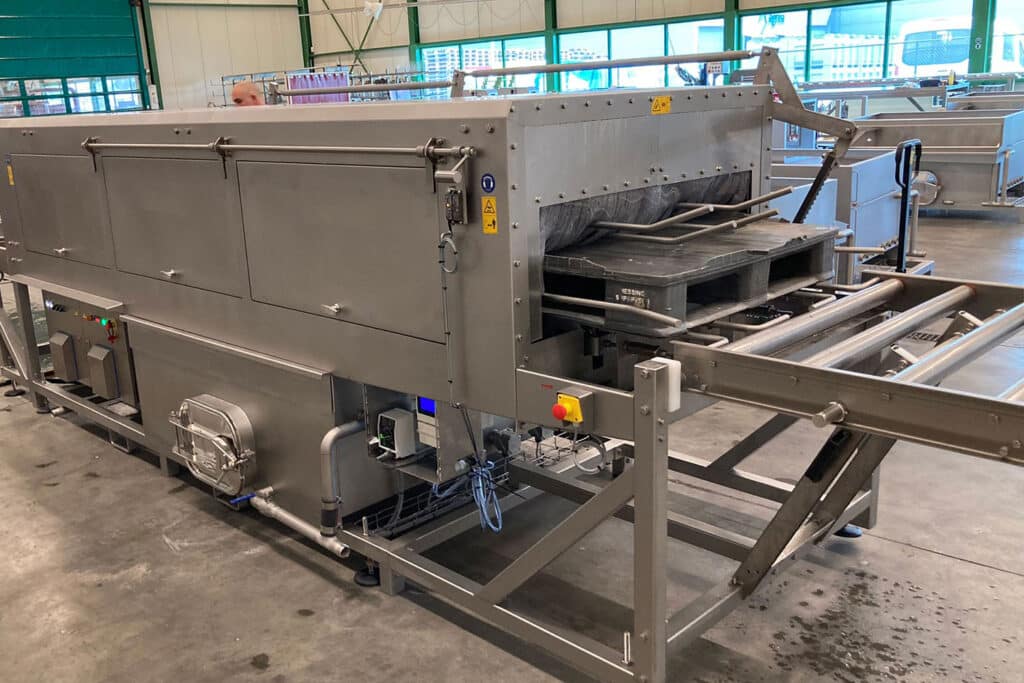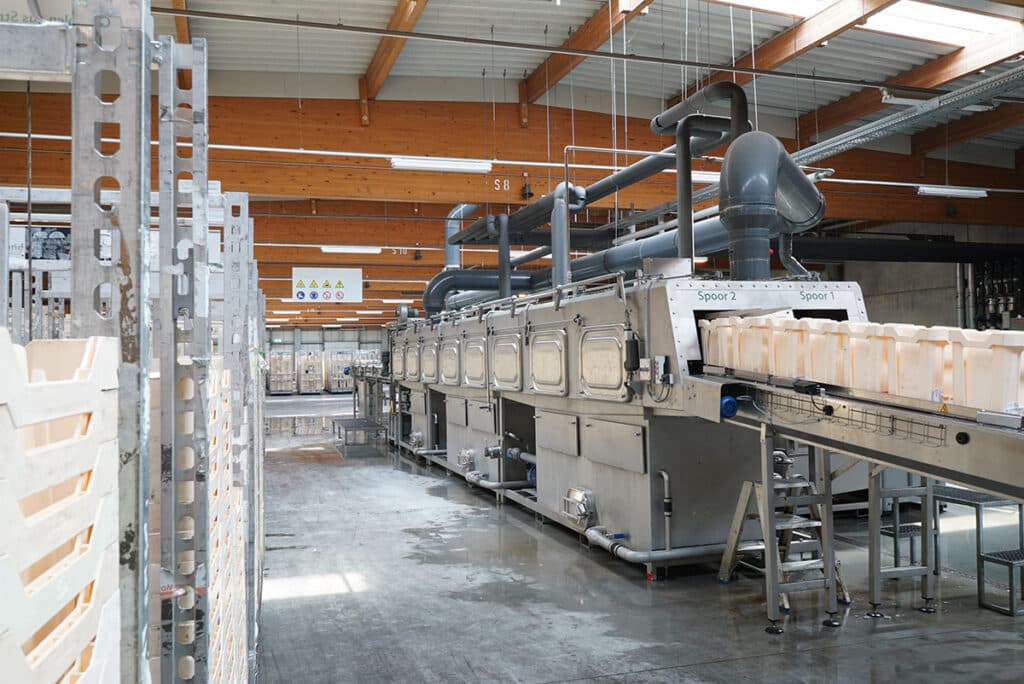Washing machines
Handwashing of reusable packaging is a demanding and time-consuming activity. It blocks the staff for long hours and requires intensive manual labor to get the job done. In most cases, the packaging may be incomplete and unclean at the end of the process. This depends on the employees’ care and diligence. It leads to potential problems with discontent customers. Washing machines can clean the returnable packaging efficiently. Then, they can return to the use cycle in optimal hygiene conditions. They offer consistent and uniform washing quality and ergonomic operation. In addition, they shorten the cleaning time. This allows a more frequent use of the packages in the logistic loop.

Batch washing machines
Batch cleaning machines offer maximum washing results with minimum water, energy and chemicals consumption. The design of the cabin model allows the goods to be loaded by hand on trolleys with gratings. For pallets or other heavier items, loading is done by forklift trucks. At the end of the washing program, the cleaned batch is unloaded, and the system is reloaded with a new dirty set.
The machines require a one-person operation suitable for lower and middle-performance segments. They occupy less floor surfaces than tunnel washers; even space-limited companies can use them. The innovative cleaning system employs a user-friendly control panel. Operators select the cleaning programs according to the contamination degree. The type of dirt that affects a specific batch is another crucial aspect. This allows a flexible use of the equipment. In addition, it ensures a simple, fast and thorough washing of packages.
Despite their compact appearance, batch cleaning machines support intensive use inside industrial applications. They balance all influencing factors for optimal washing efficiency. Examples are mechanical action (water pressure and flow), time, temperature and chemical action. Plus, they require less water consumption than tunnel systems. Industrial washing machines imply reduced detergent and chemical use.
The cabin washing machines action with customized washing trolleys. They load and move the goods into the cleaning chamber. The machines perform the first and main washing, rinsing, and spinning operations. They dry the items in the same enclosure. The cleaning cabin has broad dimensions. It accommodates trays and crates, large pallet boxes, and other types of containers. Most cabin machines are universal cleaning systems. They can be custom-made to wash other voluminous items such as barrels, buckets, utensils and vessels. This happens with the help of tailor-made washing trolleys. They can clean the support carts, such as bakery, cheese or smoking trolleys.
The trolleys that arrange the washing goods are round or square-shaped. This enables maximum use of the cleaning chamber. They can have different sizes and specific grills and configurations. The trolley’s axis fixes in the unique device of the booth. Then, the trolley rotates using a carousel principle. It has variable frequency according to the washing program and the cleaning stages.
If drying is required, the cabin cleaning washers have integrated high-performance spinning technology. This enables economical and efficient drying of the washed goods by rapid rotation. They do not need a fan or heating devices. Some models are specially designed for the automatic cleaning of pallets. These machines have automatic sliding doors and pallet stacks in-feed and out-feed systems. In addition, they allow multiple loading stations for buffer pallet stacks.
| Reference | Dimensions (mm) | Engine power (kw) | Rinse water | Weight (kg) | ||
|---|---|---|---|---|---|---|
 | 2400 x 2000 x 2900 | 45 | 14 -20 I/Batch | 2000 | View product |
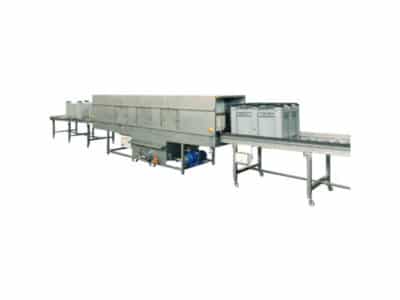
Continous washing machines
Tunnel washing machines are continuous cleaning systems. They allow a high and uninterrupted in-feed with dedicated packaging. They can sanitize thousands of plastic crates, trays, or a few hundred pallets per hour. This depends on the packaging type and dimensions. This way, they offer a high processing speed and a thorough cleaning. High-volume companies can have enough clean packages daily for each production and logistics activity.
Flexible track side guides with adjustable nozzle systems ensure optimal adaptation to the needs of various industries. They allow efficient cleaning and drying of a wide range of washed goods. The machines wash trays, crates, pallets, boxpallets, and other reusable packaging containers such as buckets and barrels. Large containers, like rigid or foldable plastic pallet boxes, are expensive. It is essential to extend their life cycle through proper hygiene work. This maximizes the cost/benefit ratio.
Tunnel cleaning machines have a modular design. It enables the installation of the cleaning line according to different washing needs and requirements. The company’s available space and internal layout are considered as well. Various cleaning processes can combine in a washing installation, each having another function. These processes can comprise first wash, multiple main wash and disinfection sections. In addition, they complete the initial rinse and rinse sections and blow-off zones for high-performance drying.
Pre-wash modules are optional and can clean soiled packages that show complex or aged traces of impurities. They have default washing and rinsing sections. They use high-pressure spray systems that enable a thorough removal of dirt. The pressure is adjustable to minimize water and energy consumption. Yet it guarantees an efficient cleaning on all sides. Optional blow-off units remove the excess water. This way, cleaned and dried packaging can quickly return to the using cycle.
Tunnel washers can clean soiling like dust, filings, oils and labels. Further, its features avoid clogging and enable the water to recirculate. This happens with an intensity appropriate to the application’s needs. Additional and integrated filter systems – easy to remove and clean – help complete this operation.
All machines can be customized using standard or tailor-designed parts to suit the industry and washing goods. Additional options allow an even closer match to the application. A few examples are boilers for hot water supply, special guides and automatic dosing of cleaning or disinfecting agents.
The machines can be stand-alone equipment or integrated into production or logistics flows. This implies using different transport conveyor setups. All models can be manually or automatically supplied with packages. It depends on the specifics of the product and the customer’s requirements regarding speed and cleaning functions. Automated tunnel washers can integrate into existing or future production lines. They have automatic control for the input and output of the washing goods. It connects to the matching on-site high-bay storage system. These tailor-made solutions can turn, lift and tilt the washing products. They eliminate manual labour from the cleaning process. Plus, for some models, all doors and parts of the machine body are insulated. This reduces heat radiation and noise levels.
| Reference | Title | Base (mm) | Water consumption (l/h) | Power consumption (KW/h) | Capacity (buc) | Material | Power supply (V) | ||
|---|---|---|---|---|---|---|---|---|---|
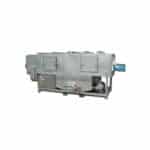 | MSC 01 | Box washing equipment MSC 01 | 3650 x 1600 | Rinse: 450 l/h, Washing cycle: 735 l/h | Drive 0,37 KWh, Heating 32 KWh, Pump 11 KWh | 600 - 1500 pcs./h | stainless steel | N.A. | View product |
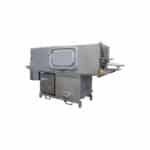 | MSC 02 | Box washing equipment MSC 02 | 3350 x 950 | Rinse: 300 l/h, Washing cycle: 320 l/h | Drive 0,37 KW/h, Heating 16 KW/h, Pump 4 KW/h | 100-400 pcs./h | stainless steel | N.A. | View product |
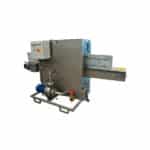 | MST 03 | Tray washing equipment MST 03 | 3000 x 950 | Rinsing: 250 l/h, Wash cycle: 120 l/h | Delivery 0,13 KWh, Heating 8 KWh, Pump 4 KWh | N.A. | stainless steel | N.A. | View product |
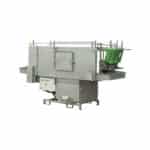 | MSV 04 | Tray washing equipment MSV 04 | 3350 x 1200 | Rinse: 300 l/h, Washing cycle: 400 l/h | Drive 0,37 KWh, Heating 24 KWh, Pump 5,5 KWh | N.A. | stainless steel | N.A. | View product |
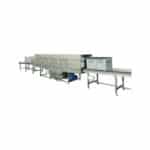 | MSB 05 | Automatic washing line for pallet boxes MSB 05 | 5500 x 1700 | Rinse: 450 l/h, Washing cycle: 1050 l/h | Drive 0,75 KWh, Heating 54 KWh, Pump 18,5 KWh | N.A. | N.A. | 3 phase 400 V, 50 Hz | View product |
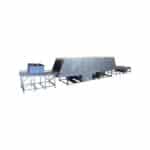 | MSB 06 | Automatic washing line for pallet boxes MSB 06 | 6240 x 2160 | Rinse: 450 l/h, Washing cycle: 735 l/h | Drive 0,75 KWh, Heating 80 KWh, Pump 22 KWh | N.A. | stainless steel | 3 phase 400 V, 50 Hz | View product |
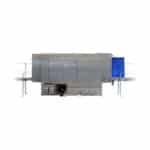 | MSP 07 | Pallet washing equipment MSP 07 | 4760 x 1350 | Rinsing: 500 l/h, Wash cycle: 1000 l/h | Delivery 0.37 kWh, Heating 32 KWh, Pump 11 KWh | 60 – 120 pcs./h | stainless steel | N.A. | View product |
Compared to other washing methods, industrial washers are economic and ecologic. They have a lower environment and company budget impact. It happens because they require reduced water and detergent consumption. In addition, they offer intelligent energy consumption. This happens due to the well-engineered cleaning system of the machines and valuable technologies such as heat recovery.
Washing machines are safe and easy to operate. This is due to a user-friendly control system with a display. They work with minimal checks from the staff. If necessary, they can stop at any time during the washing cycle. These cleaning machines require only one operator to start and supervise the equipment. It makes them stand out from different means of manual washing operations – which can involve a whole team.
When using washing machines, the operators make no physical efforts for the washing, rinsing and drying processes, leading to safer and more ergonomic working practices. At the same time, the obtained advanced degree of hygiene encourages companies to keep and reuse clean packaging to the maximum and to replace it only when damaged.
Despite their robust appearance, containers and pallet washing machines have a compact construction. They are easy to keep clean and require low maintenance. This ensures a long service life, even under intense use conditions.
The extensive range includes advanced continuous and batch industrial cleaning machines. They can integrate into low, medium or high output requirements. It depends on each application. They offer the choice of the washing program according to the contamination type and degree. Heavy soiling, oily traces or aged dirt require a more intensive washing cycle. Apart from washing and rinsing operations, all models can have additional drying systems. This makes the washed goods dry at high capacity.
Applications
Cleaning equipment is indispensable for busy companies’ logistics or production processes. It allows an increased washing capacity of reusable packaging. In addition, it provides an optimal cost/performance ratio. Unlike manual washing, these machines can cost-effectively adjust specific factors to achieve reliable cleaning. Examples include mechanical action, time, temperature, energy, water and cleaning agent consumption.
New developments in industry segments bring changes along the logistics loop. In contrast, one of the crucial components – reusable packaging – remains unaltered regarding requirements. Returnable packaging must be clean, undamaged and accessible. These things are essential for every company’s production and logistics processes. Industrial washing machines for containers and pallets enable companies to make their packaging available for the smooth running of their internal working processes. This way, clean and tidy packaging maintains a good company image and the business’s success.
Washing machines enable the implementation of cleaning and logistics technology. It is tailored to each company’s needs and requirements. This ensures an appropriate degree of automation. It provides an efficient use inside internal flow, as well. The product range covers various packaging and handling products within industrial segments. The washing results comply with the highest hygiene standards. In consequence, the machines can demonstrate their advantages even in the most rigorous hygiene requirements fields. Food or pharma industries are examples of such industries.
The speed and automation specific to the automotive industry have different requirements as the technology evolves. One of them consists of many returnable packages with different dimensions and purposes. Transport boxes, containers, pallets and blister carriers must be checked and cleaned – if necessary – before each use. The goal is to protect the items against damage and corruption. Industrial washers meet the high cleaning requirements of the automotive industry. This is valid regarding automation technology, washing volume and sanitation degree. They can clean even the toughest soiling from production, greasing or assembly processes.
Logistics is one of the industrial fields where fastness is among the main factors influencing the general flow. The goods must be handled with care to ensure an optimal shipping or unpacking method. Container and pallet washers automatically increase the efficiency and profit of work processes. They allow operators to clean and prepare the packaging for a new trip. These are quick and simple processes. The washing machines require minimum time consumption.
In the food sector, returnable packaging hygiene contributes to the healthiness and quality of the products. This is essential in open processes where they come into direct contact. Heavily soiled packages can show traces of fat, marinades, dough or creams. They are difficult to wash by hand, in particular when the stains are old.
Cleaning equipment, such as crates and pallet box washers, helps companies to meet food safety requirements. In addition, they avoid possible hazards to health. The washing machines are suitable for food processing fields. Some examples are milk, meat, bakery or confectionery, catering, and events.
The general trend to consume more fresh products is in a continuous growing. The need to find them available in safe and healthy variants increases with it. Hygienic crates and trays reduce the risk of pollution and spoilage of the products. This way, their shelf life and food safety for the consumer maximizes. Washing machines ensure that the reusable packages from the agri-food segment are visually and micro-biologically clean. They remove organic soiling and bacteria or fungi. The cleaning equipment removes durable stickers from supermarkets’ fruit and vegetable display crates.
Factory engineering must meet the strictest hygiene, safety and performance requirements. This is a particular concern for the pharma industry. Many of the cleaning machines are designed for large output applications in the form of washing tunnels. They meet all the regulations in terms of equipment operation and achieve cleaning results. They improve process safety and decrease manual operations. Further, they increase the cleanliness of medical and pharma packaging.

